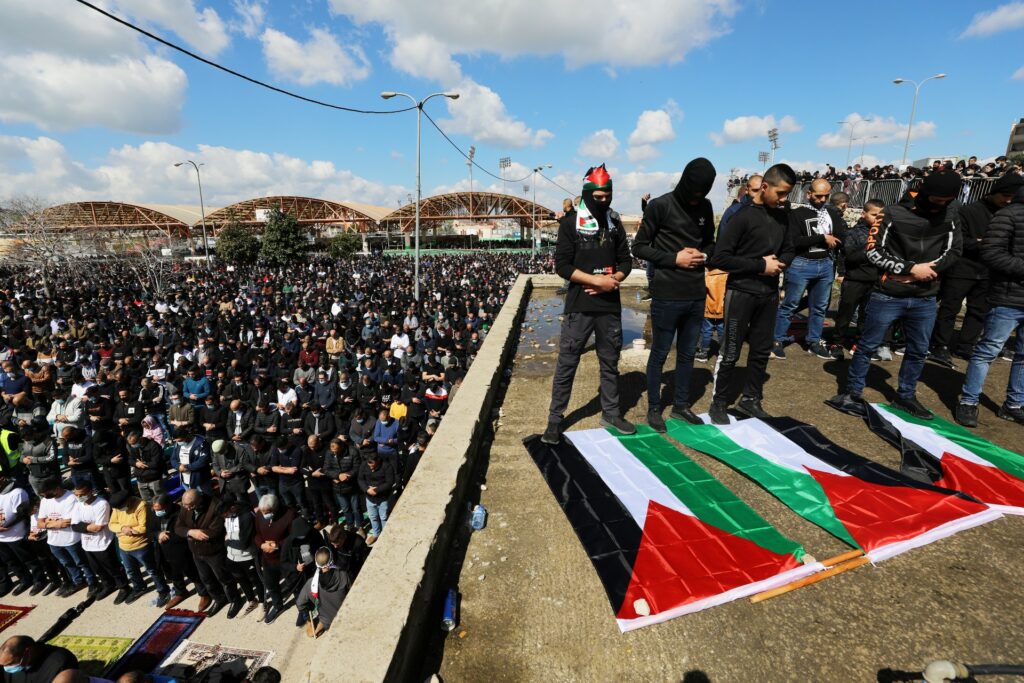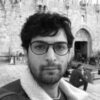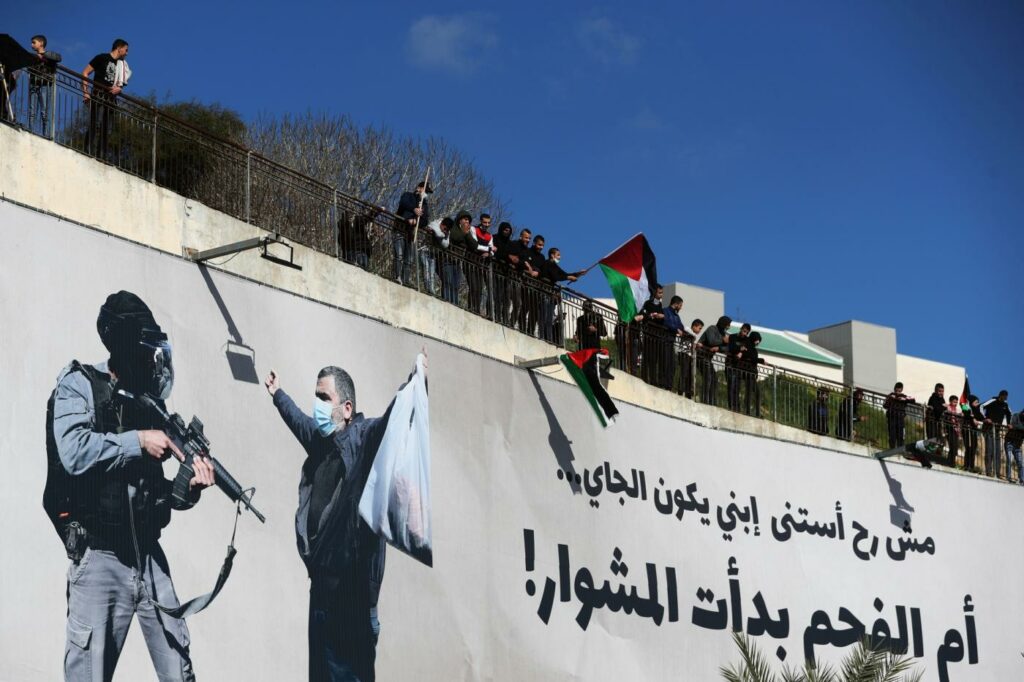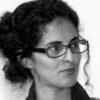This is the eighth consecutive Friday in which Palestinians, who make up 20 percent of Israel’s population, have taken to the streets to protest against the proliferation of crime in their towns and villages.
Since January, 16 Palestinians have been killed in armed clashes or as a result of criminal activity in various incidents.
Friday’s protest, said to be the largest of its kind in 20 years, was organised by a youth group called The United Fahmawi Hirak and the High Follow-Up Committee for Arab citizens of Israel.
The organisers called on protesters to wear masks and maintain social distancing during the demonstrations, as protection against Covid-19. The crowds were a sea of Palestinian flags.

Palestinians pray as they take part in a protest against a wave of crime and violence in their communities (Reuters)
Previous protests have been met by Israeli police with violence, rubber-coated bullets and tear gas. Last Friday, Samir Mahamid, the head of Umm al-Fahm municipality, was attacked by Israeli forces.
In an attempt to stop protesters, who travelled from across the country, from reaching the demonstration, Israeli police closed parts of Road 65 near Umm al-Fahm in the Wadi Ara region, according to Kan news.
Protestors have previously disrupted traffic and closed Road 65, which is a vital highway that connects the coast with Israel’s eastern regions.
Yousef Jabareen, a Arab Joint List MP and resident of Umm al-Fahm, told Middle East Eye that protests will continue until Palestinians feel safe in their towns. Jabareen was wounded during last Friday’s protest.
‘No one feels safe anymore, and we all can become victims of the crimes and armed gangs’
— Murad Hadad, activist
“Umm al-Fahm now provides a successful answer to the violence of police, who act weakly against criminals but act brutally against demonstrators,” Jabareen said.
“We demand a genuine plan to get rid of the crime and gangs. [Prime Minister Benjamin] Netanyahu’s announcements lack appropriate solutions in education, housing and welfare, and tackling crime.”
Umm al-Fahm is the biggest Palestinian town in the Wadi Ara area. Other towns demonstrated in recent weeks, including Kafr Qara, Tamra, Baqa al-Gharbiyye, Kafr Qasim and al-Mashhad.
Palestinian activist Murad Hadad told MEE that he travelled from north Israel’s Galilee area to participate in the protest. Haddad said nearly 40,000 people were present at the demonstration, the biggest since October 2000.
“It is a political matter for us. The Israeli police and authorities are not doing their role to protect the life of Palestinians inside Israel.
“No one feels safe anymore, and we all can become victims of the crimes and armed gangs,” said Haddad, who also a member of a local council.
He said that Palestinian citizens of Israel are forming campaigns in their villages, with Umm al-Fahm a focal point, to raise awareness among residents that “we have no choice but to go in the streets and to resist”.
“We feel that because we are Palestinians, we are being targeted by Israeli authorities that remain idle and inactive in rooting out the crime. If these criminal acts happened inside Jewish neighbourhoods, police action will be different towards crime,” he said.
 Protests erupt over killing of Palestinian citizen of Israel during police shootout – Read More »
Protests erupt over killing of Palestinian citizen of Israel during police shootout – Read More »
Karam Jabareen, a Fahmwai Hirak organiser, told MEE that the protest is a chance for Palestinians in Israel to make their voices heard.
“We are out in the street to demand our basic rights to live and to feel secure,” Jabareen said. “The Israeli police use violence to oppress us but not to protect us from crime.
“Today, thousands of people from all ages and backgrounds came from the Negev, Galilee and other parts of Palestine, because the criminal acts and armed gangs have profilerated in our towns.”
In February, thousands of Palestinian citizens of Israel demonstrated in several towns against the killing of a young man during an Israeli police shootout with masked gunmen in the village of Tamra.
In October 2019, the Palestinian community and its representative in Israel’s parliament, the Knesset, launched a mass car convoy driving slowly on one of the country’s busiest highways, bringing it to a near standstill in protest against Israeli police inaction over the spread of crime.
During that year, 91 Palestinian citizens of Israel were killed as a result of a violent crime, while 47 Jewish Israelis were killed in similar acts, according to newspaper Haaretz.
________________________________________________
 Mustafa Abu Sneineh – Journalist, poet and staff writer at Middle East Eye. His first poetry book A Black Cloud at the End of the Line was published in Arabic in 2016. Abu Sneineh holds a degree in Law from Birzeit University, Palestine, and an MA in Postcolonial Studies from Goldsmiths College, London. He wrote his MA dissertation on the Syrian Nationalism of the 1930s and ’40s. He previously reported in Arabic for Al-Akhbar newspaper and Canvas art magazine. Write to him at mustafa@middleeasteye.org
Mustafa Abu Sneineh – Journalist, poet and staff writer at Middle East Eye. His first poetry book A Black Cloud at the End of the Line was published in Arabic in 2016. Abu Sneineh holds a degree in Law from Birzeit University, Palestine, and an MA in Postcolonial Studies from Goldsmiths College, London. He wrote his MA dissertation on the Syrian Nationalism of the 1930s and ’40s. He previously reported in Arabic for Al-Akhbar newspaper and Canvas art magazine. Write to him at mustafa@middleeasteye.org
Lubna Masarwa is a journalist and Middle East Eye’s Palestine and Israel bureau chief, based in Jerusalem.

